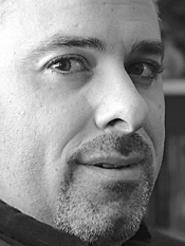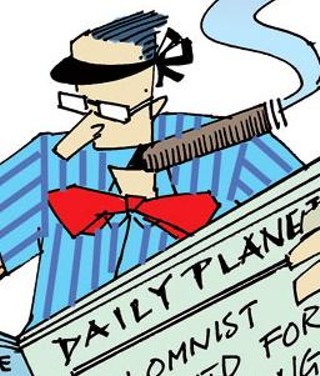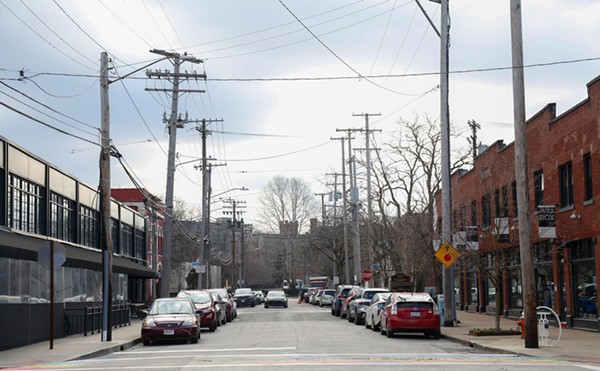On January 27, 2000, his client, Matthew Cirino, drove his Ford Explorer through a red light on West 117th Street. A Lakewood cop pulled him over. After checking Cirino's record, the officer issued a ticket for a moving violation and for driving after his license was suspended for failing to carry insurance.
But the cop made a mistake. Cirino's license was indeed suspended at the time, but it was for leaving the scene of an accident. The cop simply misread the report.
A well-known traffic-law attorney -- his web address is OhioDUI.com -- Gardner immediately noticed that Cirino had been charged with a crime he hadn't committed. They took the case to court.
And they lost.
No one disputed that the ticket stated "FRA" (meaning a violation of Ohio's Financial Responsibilities Act) or that Cirino was not under an FRA suspension. The court decided that his license was clearly suspended at the time -- even if the cop charged him with the wrong violation.
Cirino appealed. And lost again.
For Gardner, however, it wasn't that simple. His client had been convicted of a crime he hadn't even been charged with. And no one was contesting this.
A few days later, the still-seething lawyer wrote a motion asking the appeals court to reconsider. Over five pages, he alternately scolded and mocked the decision; his scorn was palpable. Gardner called the decision "illogical," "dishonest," "an opinion that any learned fair-minded judge should be ashamed [of]." The court clearly didn't "give a damn about how wrong, disingenuous and biased" its ruling was.
Then he really went off. "This panel [of judges] distorted the truth -- yes, it manufactured a gross and malicious distortion . . . Would writing an opinion that actually reflected the truth be that hard?" Even his closing -- "Ever so respectfully submitted" -- dripped with condescension.
It wasn't the smartest move. Judges are used to being treated with fawning deference. Show the least bit of disrespect, and they have innumerable ways to seek revenge. Gardner showed the motion to his partner, who advised him against filing it (because he believed it was futile). He did anyway.
That's when he learned that, under Ohio law, speaking honestly can have very bad consequences.
Appellate Judge Michael J. Corrigan relayed the scathing motion to the Ohio Supreme Court's Disciplinary Counsel. "Any judge that sees something that appears to be inappropriate, from an ethical perspective, we have a duty to report it," says Corrigan. "It's not a personal affront to me . . . It's an affront to the system." Gardner's accusations of bias, he says, were "beyond the pale."
Gardner was charged with four offenses. Two charges were dropped for lack of evidence, and he admitted to violating a third, "engaging in discourteous conduct." But the fourth -- "knowingly making a false accusation against a judge" -- would become a matter of debate.
Three attorneys heard the case. Gardner adamantly denied that he had knowingly made false accusations. He believed the appellate judges had ignored the law and favored the prosecution, and he supported this with facts from the case. No contrary evidence or testimony was presented.
But, with little explanation, the panel still found him guilty. Its penalty: a public reprimand.
Yet the Board of Commissioners on Grievances and Discipline, which oversees these panels, rejected the ruling and instead suspended Gardner's license for six months.
Gardner appealed to the Ohio Supreme Court, which rejected arguments that his words were "rhetorical hyperbole," or open to "subjective interpretation." Further, the court implied that what Gardner knew or could prove was irrelevant. It introduced a new standard for deciding such cases -- whether a "reasonable attorney" would believe the accusations false.
The court did not explain what constitutes a "reasonable attorney." Nor did it acknowledge that its ruling effectively punished Gardner for breaking a rule that didn't exist at the time.
The state has a "compelling interest in preserving public confidence in the judiciary," the court wrote. Yet it seemed to be an admission that the case had more to do with protecting judges from criticism than assessing Gardner's complaints.
It's hard to imagine Congress or the state legislature passing laws limiting criticism of them. Yet the Supreme Court insists it's not violating Gardner's free-speech rights; it just won't explain why.
Gardner requested a new hearing to defend himself against the "reasonable attorney" standard. This, too, was denied.
Gardner's suspension ends on February 13 -- at least in theory. He must reapply for his license, and he has no way of knowing how long approval might take. Nothing prevents the disciplinary counsel from ignoring Gardner's letter for weeks or even months. And he has reason to be paranoid.
In December he was informed of a new investigation, this time for "holding yourself as practicing law and for soliciting clients while you are suspended." The only evidence offered: Gardner's name continued to appear on his two-man law firm's website. Of course, the court never ordered Gardner's name removed from the website. Still, he faces a new inquiry "for not doing what they didn't tell me not to do," he says.
Remarkably, he's kept a sense of humor about it. He wonders, only half-jokingly, if the precedent in his case will ever lead to a lawyer's suspension for praising a judge whom a "reasonable attorney" would consider an idiot. But he also admits to feeling as if "my head could explode" from the increasingly surreal nature of his plight.
He hopes that the U.S. Supreme Court will agree to hear the case and clarify what attorneys can and can't say, and what judges can and cannot do about it. After all, he notes, "This is the last area open for government officials to go after their critics with impunity."














